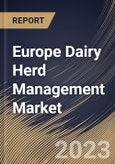Keeping a herd requires a lot of labor, and labor costs are high, raising the overall ownership cost for any livestock owner. However, a number of cutting-edge products have recently entered the market, including feeding management systems, waste management systems, and milking robots, making it possible to manage cattle with little to no human involvement. For instance, many machines now use herd management techniques to carry out daily tasks like milking or feeding cattle.
One of the defining features of the market is its constant drive for improvement and innovation. Dairy farmers and the industry as a whole have long recognized the importance of efficiently managing dairy herds to ensure optimal milk production, animal health, and overall farm sustainability. The market's evolution is driven by the quest for technological advancements, data-driven decision-making, and sustainable practices.
Dairy herd management systems help farmers maximize milk yields and overall productivity. According to Eurostat, in 2021, the EU's farms produced an estimated 161.0 million tonnes of raw milk, an increase of 0.7 million tonnes from the previous year. Additionally, the European dairy industry places a strong emphasis on animal welfare. These technologies enable farmers to monitor and ensure the well-being of their cattle, providing a more humane and comfortable environment for the animals, which is essential for meeting ethical and regulatory standards. These factors are collectively contributing to the modernization of the European dairy industry and its commitment to sustainable and efficient farming practices.
The Germany market dominated the Europe Dairy Herd Management Market, by Country in 2022, and would continue to be a dominant market till 2030; thereby, achieving a market value of $337.7 Million by 2030. The UK market is exhibiting a CAGR of 5.7% during (2023 - 2030). Additionally, The France market would experience a CAGR of 7.1% during (2023 - 2030).
Based on Type, the market is segmented into Milk Management Systems, Feeding/Nutrition Management Systems, Animal Waste Management Systems, Breeding Management, and Others. Based on End Use, the market is segmented into Large-scale Dairy Farms, Cooperative Dairy Farms, and Small-scale Dairy Farms. Based on countries, the market is segmented into Germany, UK, France, Russia, Spain, Italy, and Rest of Europe.
The market research report covers the analysis of key stake holders of the market. Key companies profiled in the report include Alta Genetics Inc. (Urus Group LP), DeLaval (Tetra Laval Group), GEA Group AG,Lely International N.V., Nedap N.V., Fullwood Ltd. (The Verder Group), SUM-IT Computer Systems Ltd, Connecteraa B.V and Merck & Co., Inc.
Scope of the Study
Market Segments Covered in the Report:
By Type- Milk Management Systems
- Feeding/Nutrition Management Systems
- Animal Waste Management Systems
- Breeding Management
- Others
- Large-scale Dairy Farms
- Cooperative Dairy Farms
- Small-scale Dairy Farms
- Germany
- UK
- France
- Russia
- Spain
- Italy
- Rest of Europe
Key Market Players
List of Companies Profiled in the Report:
- Alta Genetics Inc. (Urus Group LP)
- DeLaval (Tetra Laval Group)
- GEA Group AG
- Lely International N.V.
- Nedap N.V.
- Fullwood Ltd. (The Verder Group)
- SUM-IT Computer Systems Ltd
- Connecteraa B.V
- Merck & Co., Inc.
Unique Offerings
- Exhaustive coverage
- The highest number of Market tables and figures
- Subscription-based model available
- Guaranteed best price
- Assured post sales research support with 10% customization free
Table of Contents
Companies Mentioned
- Alta Genetics Inc. (Urus Group LP)
- DeLaval (Tetra Laval Group)
- GEA Group AG
- Lely International N.V.
- Nedap N.V.
- Fullwood Ltd. (The Verder Group)
- SUM-IT Computer Systems Ltd
- Connecteraa B.V
- Merck & Co., Inc.








